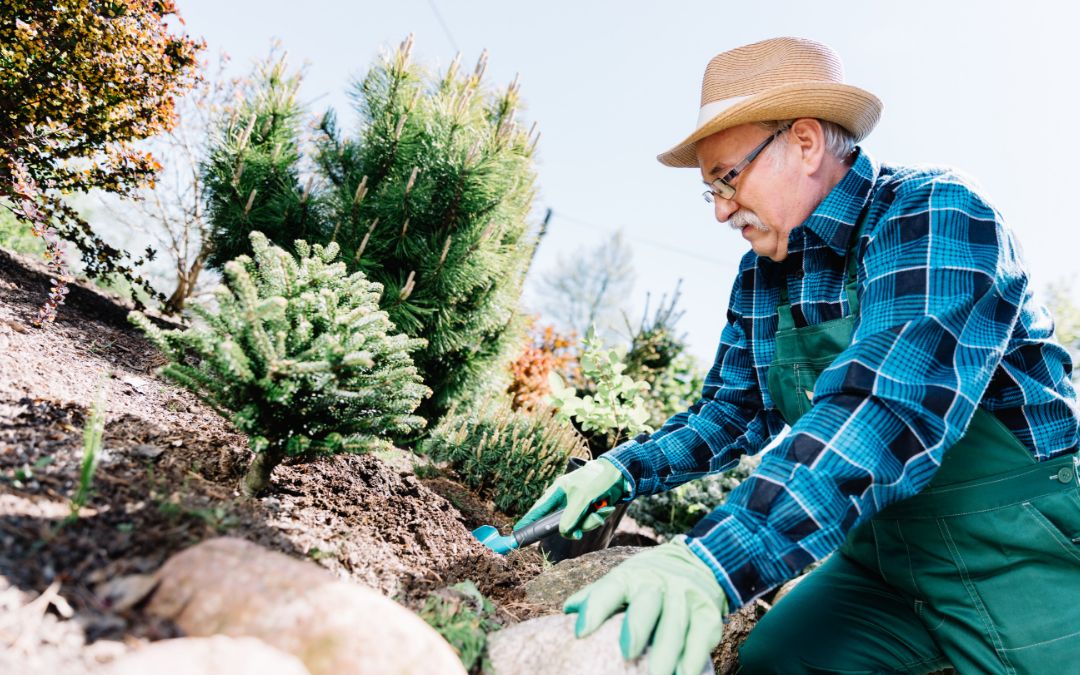Besides providing nutritious crops and beautiful flowers, there are numerous health benefits of gardening. While it’s a healthy hobby at any age, gardening can be especially beneficial to seniors. Gardening can also help with dementia and Alzheimer’s symptoms. Learn more about the various health benefits of gardening for senior adults below.
Boosts the Immune System
Exposure to two key elements, “friendly” bacteria, and the sun, can help boost your body’s immune defense.
Mycobacterium Vaccae
Because gardening involves digging in the dirt, it can be a little messy. However, a little dirt won’t hurt, actually—it may benefit you. Research suggests that bacteria found in garden soil, notably Mycobacterium vaccae, can improve your immune system. It is “good” bacteria shown to alleviate allergies, asthma, and psoriasis. Additionally, exposure to helpful bacteria can boost your body’s defense against common germs (think fewer colds and reduced risk of the flu).
Vitamin D
Any outdoor activity such as gardening is a great way to absorb sunshine. While it is important to exercise caution during sun exposure and always wear sunscreen, spending time in the sun allows the body to synthesize vitamin D. Labeled the “sunshine vitamin,” vitamin D naturally increases the body’s calcium production which is beneficial to bones and the immune system.
Encourages Physical Activity
Even light exercise can help slow down the aging process, according to recent research. Because of its variety of movements, gardening is a healthy form of both aerobic and strength-building exercise. While gardening may not seem as rigorous as swimming or riding a bike, it can build strength, stamina, and flexibility. In fact, a 2008 study suggests that 30 minutes of gardening fulfills the physical activity recommendations for senior adults. Between pulling weeds, reaching for various tools, twisting and bending, you may become so engrossed in the task that you don’t even realize you’re breaking a sweat.
As with any exercise, be careful not to go beyond your physical limits while gardening. If bending over or kneeling isn’t for you, consider a raised garden instead.
Relieves Stress
A 2017 report revealed a clear link between gardening and reduction of stress. These benefits are mostly attributed to two chemicals in the body: serotonin and cortisol.
Serotonin
The sun’s rays not only help your body produce vitamin D, but they also boost serotonin levels in your brain. Serotonin is a mood-improving hormone that can help ease anxiety. Diminished levels of serotonin can lead to depression. Additionally, changes in the hormone may play a role in cardiovascular disease.
Cortisol
Sun exposure and digging in the dirt also decreases levels of cortisol, or the “stress hormone.” While your body needs some cortisol to sustain natural functions, it can be dangerous at high levels. Elevated levels of cortisol are associated with high levels of stress, poor cognitive performance, and atrophy– or shrinking– of memory-related structures in the brain.
Provides Social Opportunities
Social relationships have a significant effect on mental and physical health. Seniors often struggle to find socialization opportunities. Research shows that adults who socialize often tend to live longer than their isolated peers. Gardening, particularly community gardens, can be a fun way to engage with others while also providing benefits to neighborhoods. At Vineyard Bluffton, we’ll have a resident garden area for both memory care and assisted living.
Sharpens the Mind
Gardening can be especially beneficial for people with dementia. A 2006 study shows that gardening may lower the risk of dementia by as much as 36 percent. Researchers tracked more than 2,800 individuals over the age of 60 for 16 years. The study concluded that physical activity, particularly gardening, could reduce the incidence of dementia in future years. Gardening stimulates a variety of senses and can promote mindfulness. Further, tending to a garden helps dementia patients connect to their current physical environment.
Gardening Creates a Sense of Purpose for Older Adults
Besides exercising the mind and body, gardening can create a sense of purpose for senior adults. The activity allows them to experience success and build confidence. Seniors often feel satisfied when they’re able to nurture plants. Additionally, it can provide peace to those who may be restless or agitated due to a memory condition.
The health benefits of gardening are undeniable, especially for aging adults or those faced with dementia or Alzheimer’s.
At Vineyard Bluffton, we’ll incorporate gardening into our interactive programming, as well as provide opportunities for residents to enjoy at their leisure.

